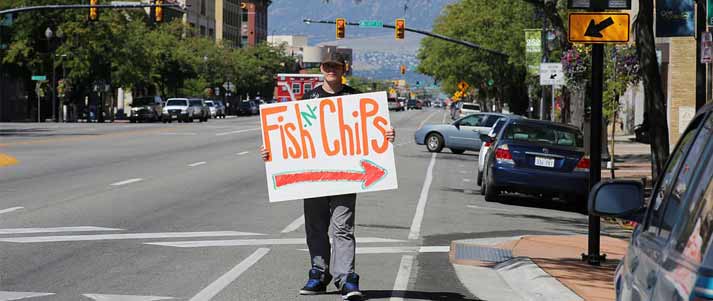How to earn money from walking
Whether you strut your stuff or barely break a snail's pace, if you've got the steps, you can turn walking into money, a career or freebies. Here's how.

Credit: Ljupco Smokovski (left), mimagephotography (right), Ikrill (background) - Shutterstock
Can you make money by walking? Surprisingly, yes – in quite a lot of ways.
As well as revealing the freebies you can get just by slapping on a pair of trainers, we've gone the extra mile to reveal the fully-fledged business ideas you can get off the ground just by walking.
As with anything, the more time or effort you put in, the better the rewards. Either way, if you're looking for unusual jobs, apps that pay you to walk or smart student start-up ideas, you've come to the right place. Walk this way...
What's in this guide?
Apps that pay you to walk
If you're looking for an app that pays you to walk, here are the best ones:
-
Sweatcoin
Available on: iOS and Android
The Sweatcoin app lets you collect 'Sweatcoins' that can then be exchanged for real-life rewards in the app.
You earn 0.95 Sweatcoins for every 1,000 steps you take (roughly half a mile). Plus, for 20 minutes a day, you can earn double Sweatcoins which is a great motivator for getting your steps in!
You can then use your coins to get discounts and sometimes free stuff from the app's store.
In the past, we've seen things like a 90-day tastecard (5 Sweatcoins), a Wireless Bluetooth headset (350 Sweatcoins) and even a £1,000 holiday in the South of France (20,000 Sweatcoins) – but it changes every day. It's also possible to donate your Sweatcoins to good causes and bid on auction prices.
Without upgrading to the Premium account (which costs £24.99/year or £4.99/month), you can cash in 10,000 steps per day or 9.50 Sweatcoins. The key is to save up coins using the steps you'd be taking anyway.
We asked members of our Facebook group, and they reported that they'd nabbed everything from virtual personal trainer sessions to tailor-made dog food and protein shakers by using the app. But there are some downsides too in the Sweatcoin reviews.
I used it for a NOW TV pass. The daily offers are usually discounts, subscription services or paying postage for a 'free' item. However, it was eating my battery and data so I just deleted it.
Callum
-
BetterPoints
Available on: iOS and Android
BetterPoints is similar to Sweatcoin in that you collect points for exercising – in this case, walking, running or cycling.
You can earn both BetterPoints and BetterTickets. BetterPoints can be collected and redeemed as vouchers at various high street stores, while BetterTickets enter you into a draw to win a bumper amount of BetterPoints.
To start earning, you simply head to the app and sign up for a programme. For instance, one of their Rewards programmes celebrates users for ditching their car and travelling through another method, with a possibility of winning 5,000 BetterPoints.
At the time of writing, you can exchange your BetterPoints for rewards including a £2 Argos gift card for 2,000 BetterPoints, a £5 Currys gift card for 5,000 BetterPoints, and a £10 Ikea gift card for 10,000 BetterPoints.
I’ve earned over £40 worth of vouchers for various stores in the past five months!
Katie
-
winwalk
Available on: Android
When using winwalk, you'll earn one winwalk coin for every 100 steps you take, up to 10,000 steps per day (100 coins).
These coins can then be used to redeem gift cards for places such as Costa, Primark and Marks & Spencer. At these retailers, you'll need 21,000 coins to receive a £10 voucher.
You can also complete 'missions' which can earn you well over 1,000 coins a pop for taking surveys and doing other simple tasks.
-
WeWard
Available on: iOS and Android
WeWard lets you exchange your steps for points (called Wards). For example, 1,500 steps can be converted to 1 Ward, 3,000 steps will bag you 3 Wards, all the way up to 25 Wards for 20,000 steps. Your steps are reset daily, so don't forget to convert them.
There are extra ways to earn Wards – take a survey, refer a friend, watch a video or take part in walking challenges.
The Wards can be exchanged for a variety of things, including discount vouchers, physical prizes, cash through bank transfers and donations to charities.
At the time of writing, you can get a £15 bank transfer for 3,000 Wards, an iPhone14 Pro for 205,000 Wards or a surprise trip for two for 75,000 Wards.
-
Charity Miles
Available on: iOS and Android
Charity Miles isn't an app for making money for yourself, but it instead lets you raise money for your favourite charities by moving. Whether that's walking, running, dancing, riding your bike or something else.
Simply select your charity when you sign up for the app, and for every mile you move, the app's corporate sponsorship pool will donate some cash. Better still, your friends and family can sponsor you too.
You might not be making money for yourself, but you can feel good about the fact that your exercise is helping those in need!
Ways to make money walking
These are the best ways to get paid to walk:
-
Get paid to do tasks
People are willing to pay for just about anything nowadays, and that includes random errands and deliveries.
If you live in an urban area where you can easily get around without a car, then this is the perfect way to earn some spare cash by walking. Although, you'll have to be prepared to go out of your way to get the job done.
From late-night chocolate runs to helping people move boxes into their new flat, you'll have to be up for anything. But you can pick jobs that fit around your schedule (and that you're comfortable doing). It's a useful way to earn an extra £30 to tide you over at the end of term.
Unfortunately, tasking apps advertising these kinds of jobs aren't available everywhere yet, but there are a couple of big ones that are growing rapidly.
TaskRabbit
Simply head to the website to register as a 'Tasker', and choose which types of tasks you'd like to do.
Errands include things like going shopping, going to the Post Office, organising paperwork, posting packages and gift wrapping. Deliveries involve being able to transport food, clothing, documents and other items quickly.
It's free to register on TaskRabbit in the UK and if you complete enough tasks and receive lots of good feedback, you could become an 'Elite Tasker' – meaning you're more likely to be chosen for work.
And, as a Tasker, you can take home 100% of your hourly earnings and tips for each task without having to pay a fee to TaskRabbit.
See the UK cities where TaskRabbit is available.
Airtasker
Airtasker is exactly the same concept as TaskRabbit, but as it's newer in the UK, it's still (mostly) London-based. We found a few tasks in the North West (around Liverpool and Manchester), and some elsewhere in the country, but this is broadly a London affair.
Once you've registered as a Tasker, you can make money from photography, cooking, removals, furniture assembly and more. It's free to sign up, but there is a small booking fee (between £1.90 – £19.90, depending on the value of the task).
Again, you should make sure you're getting paid a decent amount of money for your work, and ensure you know exactly how much time a task will take before you sign up for it.
Fees are agreed upon in advance, so a fee that initially sounds good could quickly seem tiny if the job ends up taking days.
Airtasker has come under fire back in its native Australia for allowing people to work for crazy low wages, effectively driving wages down. Make sure you know your worth!
Should you become a tasker?
These sites do offer some basic insurance, but it's usually to cover the person posting the task, rather than the Tasker (you). You might want to think about taking out your own insurance, in case you're injured while carrying out any tasks.
Also, make sure you stay safe and don't do anything you're uncomfortable with! You're essentially helping out strangers, and while it's likely everything will be fine, it's best to stay on the safe side. Make sure a friend or family member knows where you are and what task you're carrying out at all times.
And you can discover other great tasking services in our guide to money-making apps.
-
Become a human billboard

We may be living in the digital age, but we reckon you're only ever two streets away from a guy wearing an 'all you can eat buffet' sign.
There are lots of rules and regulations on placing adverts on streets in the UK, so companies often choose to hire someone to display a sign for them ('human directionals' is the official job title, in case you were wondering).
It's easy money and involves a lot of standing around, but don't expect to get paid much more than the minimum wage.
After all, it's pretty low-skilled work – all you need is a high threshold for standing around dressed as a bowling pin or a horse's head (both real student money makers!).
If you fancy it, contact some local businesses or keep your eyes peeled for job adverts and grab any opportunities that come up.
How to become a human billboard
Note that you'll probably need a license before you can get out there, but this should be organised by the business you're advertising for.
Sadly, you won't be allowed to be on your phone all day as it looks unprofessional – but you should be able to plug your headphones in and listen to an audiobook or music.
And if you don't fancy boiling to death, there's more on offer than buffet boards and fancy dress. By using the online marketplace Fiverr, you can get paid for wearing promo clothes or branded gear while you're out and about, which saves having to walk around as a hotdog in the height of summer.
Note: We'd suggest avoiding third-party sites in favour of creating your own website or social media accounts to drum up clients instead. Don't forget to approach local bars, restaurants and clubs, as well as bigger brands who want to get their message in front of students.
-
Become a tour guide
If you live somewhere busy with loads of landmarks, beauty spots or layers of history, you could become a tour guide to make money.
Tour guiding involves leading people around a town, city or wilderness route and pointing out hidden gems or points of interest along the way. You're not stuck with the great outdoors, either – you could arrange guided tours of public museums or art galleries.
Although it's often seasonal work, you can do it on your own time and schedule, and charge what you like.
Once you've started tour guiding, you can make extra money from it by converting your routes into audio or printable guides to sell from your own website. That way, you could still earn money in your sleep or in lectures.
How to become a tour guide
Tour guiding is one of the few gigs where you can get paid to walk without certificates, insurance or experience – although all of these can help if you want to make a living from it.
That said, it can be competitive, so you'll need a compelling angle and a knack for self-promotion. Do your research and look for hidden histories or a twist to give you an edge.
Popular themes for tours include the 'serial killer' circuit, the city at night, urban exploration or sights related to famous people (dead or alive).
Also bear in mind that it helps to be a good public speaker – that means being confident, as well as amusing, engaging and memorable. Having a good spiel will help you get more tips! Speaking a couple of languages can pay off, too.
And, if you're considering giving tours in a museum, gallery or other attraction, remember that they may expect you to apply in advance (or pay) to lead a guided tour on their premises. Check this out before you start advertising your services.
-
Get paid to walk dogs
Most student houses won't even let you house a goldfish, never mind a golden retriever – so if you're a dog person, becoming a dog walker can be a win-win.
There are loads of potential clients, from pensioners to people with a 9–5 job – or pretty much anyone else who can't manage two or more walks a day.
Typically, with sites like Care Pets, you'll pick up/drop off dogs and walk them for an agreed amount of time or distance, one or more times a day. Always keep your pooches on a lead for more security and less stress.
How to become a dog walker
Unsurprisingly, as a dog walker, it helps to be confident with dogs, as well as patient and able to scoop poop without panicking. You'll also need to be reliable and stick to your schedule whatever the weather.
You won't need much (if any!) equipment to become a dog walker, but you should ask the owner to supply anything you will need so that you're not out of pocket. We're talking leads or harnesses, treats, poop bags and some of their favourite toys.
It's also worth getting to know the dog's personality or medical history before agreeing to anything.
Check out our guide to becoming a pet sitter for more info on what it's like to be a dog walker. This includes things like how much money you'll make and what insurance and certificates you may need before getting started.
-
Start a fitness trail

If you're looking to get paid to walk and you're motivated, lively and can maintain a cracking pace, leading a fitness trail could be right up your street (or hill, if you're feeling hardcore).
You don't have to stick to walking, either – running and parkour are usually pretty popular too.
Getting a successful group going can generate a regular income for you, as well as a chance to meet new people. Plus you'll have zero excuses for skipping your own workout!
How to start a fitness trail or running group
You'll need to be good at getting people to keep to a schedule and helping them reach their goals. With that in mind, it's good to have an angle for your sessions, be that beginners, new mums, older people or an unusual location, for example.
Make sure your walk is tailored to your crowd. Check everyone's managing okay, and that they're motivated to keep up – don't just take off and expect to see everyone at the finish line.
You should advertise your start time, location and costs well in advance. A website, Facebook group or flyers around uni are handy for adding info about the route or fitness requirements and give you space to pitch yourself.
It's probably a good idea to get some public liability insurance too as you'll be dealing with people who could stub a toe, trip up or otherwise injure themselves. Cover starts from around £50 per year, so get some cash bookings in place before you cough up.
A first-aid certificate is also a great investment, so check if your uni runs any free or subsidised first-aid courses. Or, if you think a career in fitness could be for you, look into a group exercise or personal training certificate, or another coaching qualification.
Finally, if you've got grander plans in mind, you could consider making a full day of it – sponsored walks, entertainment en route or an Iron Man-style event are all achievable and will attract more people.
-
Write a book for walkers
Walking guides are always popular, as proven by Time Out walks and even the AA walking guides (and they must be in demand for a driving company to bother writing them!).
Once you've got a decent collection of routes, you'll need to type them up and either publish them yourself (as an eBook or in print) or pitch them to an agent. It's not a fast route to big money, but it's the kind of project you can do at a low cost and then leave to generate passive income for years to come.
How to write a walking book
First and foremost, you'll need to spend some time sourcing your own routes, ideally with a strong theme or angle like countryside walks, a city guide, art and culture sites, or something else popular or quirky. Check the best-sellers in your local bookshop and see if you can beat them.
As for writing the book itself, it takes discipline to get words on paper – but if you can write long essays for your degree, you're already up to the job.
Ideally, you'll also want to get someone else to proofread the book and test out your routes before you launch them into the world. You can ask your friends and family to help here, or head to Fiverr and hire a proofreader.
An eBook is the fastest and cheapest way to get your words out there, and luckily for you, we have a whole guide to publishing an eBook.
You'll need to convert your content to an appropriate format, but websites like Smashwords and Amazon's Kindle Direct Publishing can convert a simple Word document for free. You can also use them to submit your book, which will then show up in stores.
-
Get paid to hand out leaflets

Stuffing
junkleaflets through letterboxes isn't going to win you any friends, but it can help you get fit and put money in your bank account.How to get paid to hand out leaflets
There is no shortage of companies that will pay for your services, but it's best to try Gumtree for local leads, or simply pop into nearby stores to ask managers.
You'll be handed a bundle of leaflets and a route, so the only thing left for you to do is plan ahead for the weather.
Leaflet dropping is typically flexible work, but before you get cracking, double-check that there aren't any hidden pitfalls (like limits on how long you take, or how far you go).
-
Become a model
Perhaps we're being a teeny bit liberal with the definition of 'getting paid to walk' here. But then again, as a model, you can literally earn money by walking up and down a runway.
Before you switch off and decide you're not attractive enough to be a model (not that you should be thinking that, obv), here's some good news: you don't always need to be ridiculously good-looking to be a model.
What you do need is to be ok with having people do your hair and make-up and getting papped on-demand, as well as wearing, eating or pointing at stuff on camera that you wouldn't usually touch with a barge pole.
But, ultimately, you don't need any experience or training to get into it and you'll (sometimes) get paid to go travelling. Plus, few things beat the ego boost!
How to get paid as a model
As we've touched on already, you don't have to be a Kate Moss lookalike to get booked as a model (although we won't deny that it probably helps).
The candidly named UGLY Models Agency say they're looking for men and women of all shapes and sizes because they're about character, not airbrushing. Sign us up!
If you reckon you could be Ryan Gosling's body double or could give Margot Robbie a run for her money, there's no shortage of casting agencies out there. Head to Google to find them, or just go on Instagram and pout like your life depends on it.
A word to the wise, though: don't expect overnight success, celeb hijinks or your face on the cover of Vogue. Modelling can be hard work, cut-throat and not always well-paid or regular work. There can also be a lot of traipsing around to auditions and waiting for callbacks.
Extra tips for earning money walking
To make more money from walking, remember these key tips:
- It doesn't matter how skint you think you are, if you earn more than the personal allowance (currently £12,570 per year, not including your Maintenance Loan), HRMC gets a cut! For a little help, find out how tax works in five minutes with our guide.
- If you register as self-employed you can reduce your tax bill with legitimate business costs, including a DBS check, insurance, advertising or web hosting. Just remember to keep detailed records, receipts and paperwork.
- Don't pile cash into your business unless it's essential and you're sure it's a goer. Make use of free advertising online (social media, basically) or haggle for swaps before cracking open your wallet.
- Only employers and licensing bodies can apply for a full DBS check – individuals can apply for a Basic DBS check instead. You'll need to supply ID documents and pay £18 to apply. It can take up to 14 days for your certificate to arrive.
If you're not much of a walker, we've got a whole load of quick ways to make money to get you through a tight spot. Take your pick!















